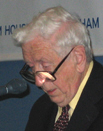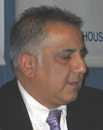Culture, Value and Identity as Elements in European Cohesion (iv): The importance of History and Peace
Dr. Garret FitzGerald (Former Prime Minister of Ireland), Prakash Daswani (Chief Executive, Culture Co-operation) and J. Sean Curtin (Fellow, GLOCOM and Asia Times)
The following questions refer to Dr. FitzGerald's speech, which can be read here.
Sean Curtin: Do you think that the ideas of peace and mutual prosperity can help build a lasting sense of shared European identity? For countries that aspire to join the EU such as Turkey and the Ukraine, these are certainly aspects that attract them to the EU. Finding a balance between national identity and European identity is perhaps the most difficult challenge. What are your views about how national and European history are taught in schools, especially European history?
 Garret FitzGerald: Obviously, cultural communication may be difficult between different people with different levels of education, the outcome of that is to develop people's cultural sensitivity. The problem for me is that education is increasingly being presented as a purely economic issue, although that aspect is important. Garret FitzGerald: Obviously, cultural communication may be difficult between different people with different levels of education, the outcome of that is to develop people's cultural sensitivity. The problem for me is that education is increasingly being presented as a purely economic issue, although that aspect is important.
If you look at education purely from an economic perspective, you are really missing the point. I believe everyone has a right to develop their potential to the full and that includes further education being accessible to all. I find it entirely pathetic to read that the British Labour Party is saying that it is a waste of time educating 50 percent of the people through higher education. In Ireland we are educating 60 percent, we are aiming for two-thirds in higher education. Now the notion that when we reach 50 percent, we should stop educating people is a very strange idea.
I recognize the difficulty with introducing European culture, because European high culture is only acceptable to certain people and its European character cannot be appreciated by all. But you have to try to change that through education.
Secondly, I would put the emphasis on values. This is because of the fact that we have, when looking back at our history, been appalled by it and decided to turn it on its head. To reverse all the basic attitudes we have and do the exact opposite for the last fifty years. It's an extraordinary revolution and I cannot understand how nobody notices it. It has never occurred to anybody.
I have spoken on this subject in other countries and the problem is that there is not any significant recognition of the reversal of history that has been achieved and the fundamental subversive character and its potential for changing the world over time. I think we need to achieve a more conscious understanding of this.
Although Britain, or at least the majority of British people, take a different approach to Europe, the majority of European values are actually shared by most Britons. However, this fact does not make British people feel any closer to Europe.
[The situation is different in Ireland,] even when we [the Irish people] have deep differences with Britain or others countries in Europe, we still have these shared common values.
How did this situation come about? It came about because we [the Irish people] looked at our history and decided to reject it. We [the Irish people] saw what a wrong course history had taken, because we had a sense of history. This reinforces how important it is that people do learn about their history.
I read in a British paper that there is a need to teach more history. However, what the article was basically about was the need to teach more popular patriotic account of British myth, as far as I could make out.
You know, we all have to get over these kinds of myths. You know, we [the Irish people] have for 50 years been re-examining our myths and we have had to reverse our nationalism, reverse our nationalism that involved a claim on all lands [of Ireland], to realize that this created a provocative, dangerous, subversive atmosphere to establishing peace. Irish nationalism has become a pluralist nationalism, not a mono-cultural nationalism.
Our natural instinct in the new state was to hang on to sovereignty, we had to reverse that completely in order to join the EU we had to recognize the maximum amount of sovereignty sharing was better for us.
A small country like Ireland cannot exploit anyone else. Sovereignty is the power to exploit other countries. Only large countries can exploit sovereignty in that way, if we share our sovereignty we are better off. Britain can't exploit us with their cheap food policy any longer, the French and the Germans can't keep our products out, so we can invite industry in and have a better standard of living and jobs, so the sharing of sovereignty becomes ever lighter.
So, we reversed our previous attitude of holding on to sovereignty so recently acquired with such difficulty. So, we have gone through this revolution, the Germans have done it through the democratic revolutions in Germany during the last 50 years. There are a few other countries that need to go through this process and revise their history. They need to study a broader history of Europe as a whole.
Someone did once send me a history of Europe that stated that we need to get rid of all these national myths, the only real problem with the book is that it did not mention Ireland at any stage.
 Prakash Daswani: I would like to address the point about whether Europe needs a new set of values to do with peace and so on. I am not an expert and cannot talk from any great experience, but I have a Polish electrician working for me, who I think of very highly. I was talking to him the other day and asking him why he left his own country and his three beautiful daughters for several months to come and work in London? It is because [in Poland] there is no work? 30 million jobs have been lost in former socialist countries. I am sure that Marrek the electrician, would love to have more peace and justice, but now right now he needs to be reunited with his family and work that will keep him there. Prakash Daswani: I would like to address the point about whether Europe needs a new set of values to do with peace and so on. I am not an expert and cannot talk from any great experience, but I have a Polish electrician working for me, who I think of very highly. I was talking to him the other day and asking him why he left his own country and his three beautiful daughters for several months to come and work in London? It is because [in Poland] there is no work? 30 million jobs have been lost in former socialist countries. I am sure that Marrek the electrician, would love to have more peace and justice, but now right now he needs to be reunited with his family and work that will keep him there.
Sean Curtin: Yes, that is why I mentioned mutual prosperity. Peace means peace and mutual prosperity.
Prakash Daswani: I still think that for most ordinary people those kinds of concerns seem quite distant.
This is the final part of a four-part article. The first part can be found here.
Profile: Garret FitzGerald
He served three times as Irish Prime Minister (Taoiseach), heading two coalition governments, from July 1981 to February 1982, and from December 1982 to June 1987 as the seventh Taoiseach of the Republic of Ireland. He earlier severed as Irish Foreign Minister.
He was born on 9 February 1926. After studying economics and law at University College Dublin, he lectured (1959-73) in political economy at his alma mater. He was first elected to the Irish parliament (Dail) in 1969 as a member of the Fine Gael. He was minister of foreign affairs (1973-77), then became party leader and subsequently prime minister in 1981 as a result of a coalition with the Labour party. Although defeated in early 1982, FitzGerald regained power later that year and was again prime minister from late 1982 to 1987, when election losses caused him to resign as party leader. A moderate nationalist, he was the driving force behind the Anglo-Irish Agreement of 1985.
He retired from parliament in 1992 and since then he has written a popular weekly column every Saturday in The Irish Times and been involved in many international activities. He came out of retirement to campaign for a yes vote in the second Nice Referendum, held in 2002.
For a longer profile click here:
The above comments were made at Chatham House (Royal Institute for International Affairs) in London on 28 January 2005. They formed part of an event called Europe: United or Divided by Culture which was organized by The European Cultural Foundation (UK National Committee), the Chatham House European Programme and International Intelligence On Culture.
| 




